It looks like you're using an Ad Blocker.
Please white-list or disable AboveTopSecret.com in your ad-blocking tool.
Thank you.
Some features of ATS will be disabled while you continue to use an ad-blocker.
28
share:
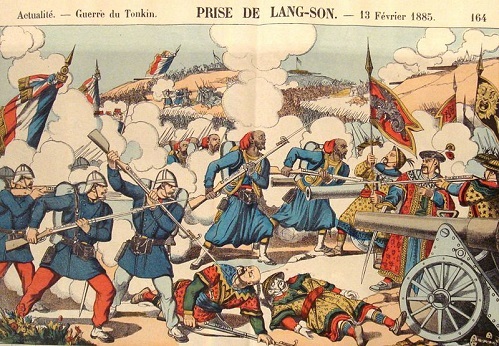
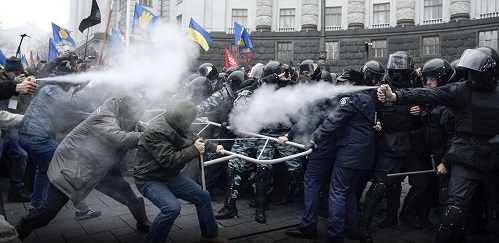
I've been reading a bit about the history of Vietnam -- not the U.S. Vietnam War, which is what leaps to most people's minds when they hear the country's name -- but Vietnam's ancient, medieval, and early modern history. What I would like to discuss here today is the way that the French colonized Vietnam starting in the 1800s and systematically destroyed its society and (to a great degree) its culture...and how this is vital to understanding what's going on in your "developed" nation today.
Why am I posting this, and why is it important? I'm not here to beat on the tired old "evil imperialist European" drum. That is a cliched line of thought by now, and it is worth remembering that before the French came, Vietnam itself was an "empire," colonizing and exploiting its neighbors. All humans do horrible things, and the issue here today is not France-bashing.
The reason why this topic is very, very important is that the way Vietnam was taken down by the French holds important clues as to how ANY society can be taken down and subverted...including your own society!
Vietnam was gradually broken down politically, culturally, and economically in ways that bear remarkable similarities to many of the conspiracy theories discussed here on ATS. And this was done starting in the 1800s, a long time ago. If anything, "the powers that be" can only have gotten better at this game. So let's look at the Vietnam colonial story, which will provide an anatomy of some of the techniques used to subvert nations and cultures. These techniques (and more sophisticated variations) are still being employed around the world as we speak. Whether you believe in the attempt to create a one-world NWO or merely the desire to subvert various nations and cultures for whatever reasons, you will find important clues to how it is done in the Vietnam story. And people who think that attempts to subvert nations and cultures are "just paranoid conspiracy theories" can be shown this information as evidence that systematic takedown techniques not only exist...but have existed for a very long time.
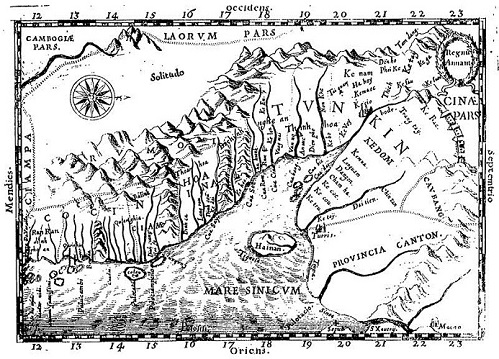
Ready to get started? I will organize the information as follows in the next few posts.
Part I. Colonial Vietnam's story
A) Vietnam before the French
B) The beginning of the takedown
C) The takedown climaxes
Part II. Lessons for today's world
edit on 8-3-2014 by Never Despise because: (no reason given)
Part I: Colonial Vietnam's Story
Vietnam before the French

What is today known as "Vietnam" has a very long history, with human settlements in the area as long ago as 20,000 B.C. Vietnam as a political entity has a rather complex history, and it was not always a single nation. For much of history, the northern part was known as "Dai Viet" and the southern was a distinct culture known as "Champa." These two were unified and split multiple times in multiple ways. Parts were sometimes overrun by outsiders, including China, the Mongols, and others, and different dynasties came and went.
In periods in which there was unity, the nation was usually ruled by an Emperor and the nobility (the "mandarins,") who governed in accordance with Confucian principles, although Vietnamese form of Confucianism was a bit different from the Chinese version. To simplify grossly, Vietnamese villages had a great deal of autonomy, and were usually ruled by "village councils," who took care of local affairs. Villages were often protected by dense thickets of bamboo and guarded against outsiders, like little fortresses. Outsiders were mistrusted, and the families within a given village had strong ties to the land and to the spirits of their ancestors, who were honored in an animist-style religious rituals, along with the rituals of Vietnamese Buddhism. Even the Emperor and the mandarins had limited authority over what went on in a given village. The central government officials would collect taxes and occasionally conscripts for war from the villages; otherwise the villages were generally left alone in their own little "private universes."

The Vietnamese Confucian worldview is worth briefly examining. As the Emperor and mandarins had limited control over the villages, their government took the form of elaborate Confucian rituals, designed to maintain harmony and balance between the forces of yin and yang. The western idea of "progress" (time as an "arrow," moving "forward" and ever increasing in benefits and novelty) was largely absent. Time was seen as cyclical, in harmony with the seasons and the repetitious demands of rice farming. It was less important to make "progress" than to maintain harmony with pre-established patterns. Confucian ritual was to be copied from one generation to the next, both on the macro-level of the Emperor and court and the micro-levels of the family and village. Ritual served to stabilize, innovation was frowned upon, and cyclic repetition of time-honored traditions was more valued than seeking new things. In this way, as pointed out by writer and Vietnam expert Frances Fitzgerald, Vietnamese Confucianism was a deeply "conservative" worldview (i.e., respecting and seeking to repeat the past), as opposed to a "progressive" one (i.e., seeking to break new grounds and innovate). As with all things, this had benefits and drawbacks. When Vietnam was left alone to itself, it made for relative stability and harmony. When it encountered other civilizations (such as the Mongols, Chinese, or French), it could become a stumbling block to necessary change.
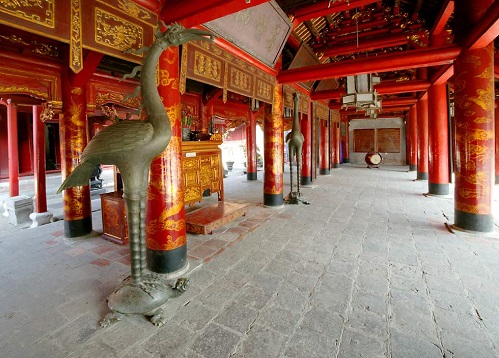
Vietnam before the French

What is today known as "Vietnam" has a very long history, with human settlements in the area as long ago as 20,000 B.C. Vietnam as a political entity has a rather complex history, and it was not always a single nation. For much of history, the northern part was known as "Dai Viet" and the southern was a distinct culture known as "Champa." These two were unified and split multiple times in multiple ways. Parts were sometimes overrun by outsiders, including China, the Mongols, and others, and different dynasties came and went.
In periods in which there was unity, the nation was usually ruled by an Emperor and the nobility (the "mandarins,") who governed in accordance with Confucian principles, although Vietnamese form of Confucianism was a bit different from the Chinese version. To simplify grossly, Vietnamese villages had a great deal of autonomy, and were usually ruled by "village councils," who took care of local affairs. Villages were often protected by dense thickets of bamboo and guarded against outsiders, like little fortresses. Outsiders were mistrusted, and the families within a given village had strong ties to the land and to the spirits of their ancestors, who were honored in an animist-style religious rituals, along with the rituals of Vietnamese Buddhism. Even the Emperor and the mandarins had limited authority over what went on in a given village. The central government officials would collect taxes and occasionally conscripts for war from the villages; otherwise the villages were generally left alone in their own little "private universes."

The Vietnamese Confucian worldview is worth briefly examining. As the Emperor and mandarins had limited control over the villages, their government took the form of elaborate Confucian rituals, designed to maintain harmony and balance between the forces of yin and yang. The western idea of "progress" (time as an "arrow," moving "forward" and ever increasing in benefits and novelty) was largely absent. Time was seen as cyclical, in harmony with the seasons and the repetitious demands of rice farming. It was less important to make "progress" than to maintain harmony with pre-established patterns. Confucian ritual was to be copied from one generation to the next, both on the macro-level of the Emperor and court and the micro-levels of the family and village. Ritual served to stabilize, innovation was frowned upon, and cyclic repetition of time-honored traditions was more valued than seeking new things. In this way, as pointed out by writer and Vietnam expert Frances Fitzgerald, Vietnamese Confucianism was a deeply "conservative" worldview (i.e., respecting and seeking to repeat the past), as opposed to a "progressive" one (i.e., seeking to break new grounds and innovate). As with all things, this had benefits and drawbacks. When Vietnam was left alone to itself, it made for relative stability and harmony. When it encountered other civilizations (such as the Mongols, Chinese, or French), it could become a stumbling block to necessary change.

The Beginning of the Takedown
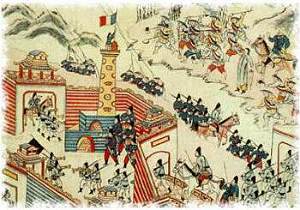
It is important to realize that the French colonization of Vietnam took place slowly. The first contacts began with merchants seeking trade as early as the seventeenth century, and later missionaries looking for converts to Catholicism. For a long time, the French saw Vietnam as "not worth the trouble:" trade was sluggish and unprofitable compared to other places in Southeast Asia. Gradually, however, as France began to compete with other colonial empires around the world, it started to show more interest in Vietnam.
In 1873, a French adventurer named Francis Garnier bombarded Hanoi and other cities in Vietnam from his boat -- something that was not officially sanctioned by France. In the 1880s, however, France authorized the conquest of the Red River Delta and further attacks on Hanoi, using the excuse of (wildly exaggerated) persecution of missionaries. This cover story gave them the moral justification for the beginnings of colonial incursion.
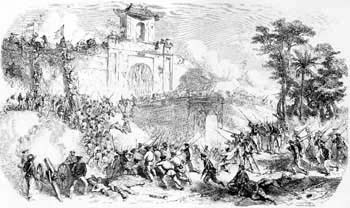
As it happened, Vietnam was not as able to ward off the French as it might otherwise have been, because at that particular point in history, the country was fragmenting in the face of a number of other problems. There was a domestic rebellion (largely based in tensions between Christian and non-Christians, and also egged on by the French), incursions from China, and increasing bandit attacks. Eventually the chaos made it easy for the French to occupy the capital of Hue and install a puppet emperor, Dong Kanh. A rival Imperial faction fled to the hills and carried on a long but ineffective rebellion, finally surrendering after 20 years of fighting. Backing their puppet emperor and with their superior technology, the French were now in total command.
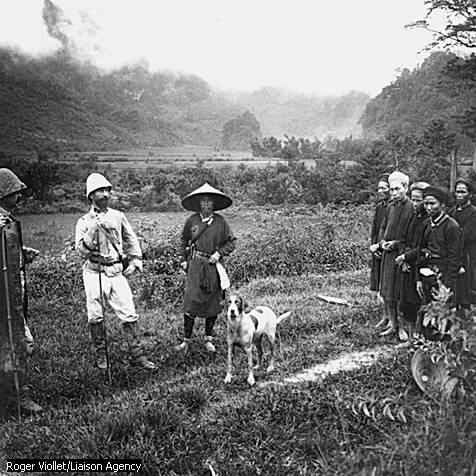
The Takedown Climaxes

Under France, "Vietnam" as a single nation ceased to exist. It became part of "Indochina," the general term for the French colonies in Southeast Asia that included territory in what is now Laos and Cambodia. Vietnam itself was split into three so-called pays: Annam, Cochin China, and Tonkin, each of which was administered in a slightly separate way.
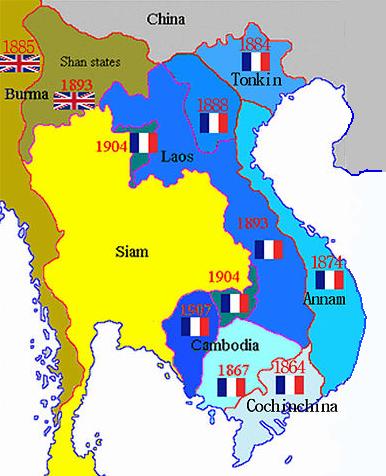
The French retained the old Vietnamese Imperial court with its puppet Emperor, but the ancient Confucian rituals carried out by the Emperor and mandarins became increasingly irrelevant to what was really happening in the country. The old aristocracy became a symbolic figleaf, covering up a new and uglier reality.
Before French rule, Vietnam had been primarily an agricultural subsistence economy, based on rice farming. France set about to change that, establishing massive plantations for modern commodities like rubber, and huge mining operations for coal, zinc, and tin. The French built roads, canals, railways, and new market cities. It claimed these were for the benefit of the Vietnamese people, but they primarily served French economic needs, allowing France to more efficiently transport and process the commodities it was extracting from the earth.
The manpower needed bring about this huge change came, of course, from the Vietnamese people, rather than from French colonists. The Vietnamese were reduced to the status of near-slavery, although nobody ever came along and said directly, "you must leave your village farms work in the mines and on the plantations." The transformation was more subtle.

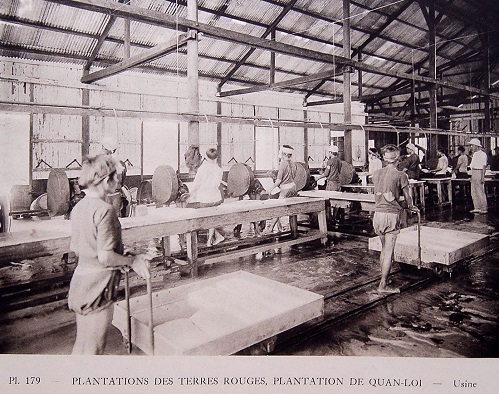
First, the French (acting through the puppet-run imperial Court, now a shadow of its former glory) jacked up taxes on the Vietnamese peasantry. They also had the central government establish a monopoly on salt, alcohol, and opium. With the taxes and monopoly, prices for necessities soared as much as 600%, forcing huge numbers of peasants into bankruptcy and ruin. They sold their ancestral lands and had to take the only jobs available to survive: working in slave-like conditions in French mines and on French plantations. The French justified this impoverishment by blandly saying that the country "had always been primitive and backwards," and that the new work would have a "modernizing and civilizing" impact on Vietnam.

As we saw earlier, traditionally, villages had a lot of autonomy. To complete their domination, the French had to break this. They did so under the guise of "democracy," making a law that the village councils had to be "democratically elected." They also took away from the councils their former powers of raising taxes and submitting census information, transferring these functions to the central state. This weakened local power in the villages and made things more chaotic. In addition, the French tacitly encouraged the greed of local elites. Whereas previously much land had been communally farmed, by introducing "modern systems of ownership," the French allowed the local elites to seize formerly communal land and property and call it their own. This impoverished villagers (further helping to drive them to take miserable slave-like work in the mines and the plantations) and created resentment, so that the village peasants began to get angry at the village elites. Textbook divide-and-conquer: with the villagers at each other's throats, it would be impossible for them to cooperate in anti-French efforts.
The cycle of dominance was now complete. The formerly proud Empire of Vietnam, a land of deep traditions and beautiful farms cherished for generations, had been turned into a slave state, with penniless serfs toiling in hellish conditions in French-owned mines and plantations. Vietnam had been conquered, and its millennia-old ways of life and culture had been subverted by clever socio-economic warfare as well as actual force of arms.

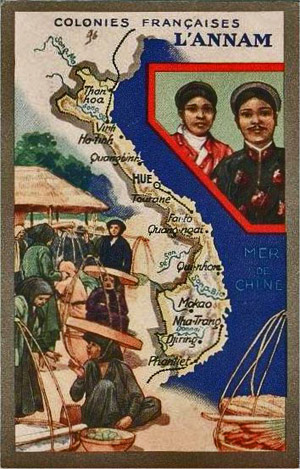

It is important to realize that the French colonization of Vietnam took place slowly. The first contacts began with merchants seeking trade as early as the seventeenth century, and later missionaries looking for converts to Catholicism. For a long time, the French saw Vietnam as "not worth the trouble:" trade was sluggish and unprofitable compared to other places in Southeast Asia. Gradually, however, as France began to compete with other colonial empires around the world, it started to show more interest in Vietnam.
In 1873, a French adventurer named Francis Garnier bombarded Hanoi and other cities in Vietnam from his boat -- something that was not officially sanctioned by France. In the 1880s, however, France authorized the conquest of the Red River Delta and further attacks on Hanoi, using the excuse of (wildly exaggerated) persecution of missionaries. This cover story gave them the moral justification for the beginnings of colonial incursion.

As it happened, Vietnam was not as able to ward off the French as it might otherwise have been, because at that particular point in history, the country was fragmenting in the face of a number of other problems. There was a domestic rebellion (largely based in tensions between Christian and non-Christians, and also egged on by the French), incursions from China, and increasing bandit attacks. Eventually the chaos made it easy for the French to occupy the capital of Hue and install a puppet emperor, Dong Kanh. A rival Imperial faction fled to the hills and carried on a long but ineffective rebellion, finally surrendering after 20 years of fighting. Backing their puppet emperor and with their superior technology, the French were now in total command.

The Takedown Climaxes

Under France, "Vietnam" as a single nation ceased to exist. It became part of "Indochina," the general term for the French colonies in Southeast Asia that included territory in what is now Laos and Cambodia. Vietnam itself was split into three so-called pays: Annam, Cochin China, and Tonkin, each of which was administered in a slightly separate way.

The French retained the old Vietnamese Imperial court with its puppet Emperor, but the ancient Confucian rituals carried out by the Emperor and mandarins became increasingly irrelevant to what was really happening in the country. The old aristocracy became a symbolic figleaf, covering up a new and uglier reality.
Before French rule, Vietnam had been primarily an agricultural subsistence economy, based on rice farming. France set about to change that, establishing massive plantations for modern commodities like rubber, and huge mining operations for coal, zinc, and tin. The French built roads, canals, railways, and new market cities. It claimed these were for the benefit of the Vietnamese people, but they primarily served French economic needs, allowing France to more efficiently transport and process the commodities it was extracting from the earth.
The manpower needed bring about this huge change came, of course, from the Vietnamese people, rather than from French colonists. The Vietnamese were reduced to the status of near-slavery, although nobody ever came along and said directly, "you must leave your village farms work in the mines and on the plantations." The transformation was more subtle.


First, the French (acting through the puppet-run imperial Court, now a shadow of its former glory) jacked up taxes on the Vietnamese peasantry. They also had the central government establish a monopoly on salt, alcohol, and opium. With the taxes and monopoly, prices for necessities soared as much as 600%, forcing huge numbers of peasants into bankruptcy and ruin. They sold their ancestral lands and had to take the only jobs available to survive: working in slave-like conditions in French mines and on French plantations. The French justified this impoverishment by blandly saying that the country "had always been primitive and backwards," and that the new work would have a "modernizing and civilizing" impact on Vietnam.

As we saw earlier, traditionally, villages had a lot of autonomy. To complete their domination, the French had to break this. They did so under the guise of "democracy," making a law that the village councils had to be "democratically elected." They also took away from the councils their former powers of raising taxes and submitting census information, transferring these functions to the central state. This weakened local power in the villages and made things more chaotic. In addition, the French tacitly encouraged the greed of local elites. Whereas previously much land had been communally farmed, by introducing "modern systems of ownership," the French allowed the local elites to seize formerly communal land and property and call it their own. This impoverished villagers (further helping to drive them to take miserable slave-like work in the mines and the plantations) and created resentment, so that the village peasants began to get angry at the village elites. Textbook divide-and-conquer: with the villagers at each other's throats, it would be impossible for them to cooperate in anti-French efforts.
The cycle of dominance was now complete. The formerly proud Empire of Vietnam, a land of deep traditions and beautiful farms cherished for generations, had been turned into a slave state, with penniless serfs toiling in hellish conditions in French-owned mines and plantations. Vietnam had been conquered, and its millennia-old ways of life and culture had been subverted by clever socio-economic warfare as well as actual force of arms.


edit on 8-3-2014 by Never Despise because: (no reason given)
Part II: Lessons for today's world


So, if you've read all the above, a few things might be apparent when you compare the sad story of Vietnam's takedown with the world of today. I will list the points I feel are relevant. Please feel free to brainstorm and add your own.
Subversion and takedown takes time.
It was a long process in Vietnam; it didn't happen overnight. Like the old metaphor of the frog slowly boiling in the pot of water, at any given point it might be argued that not much was changing. The old Vietnamese imperial government and its ritual symbols remained intact, although it came to have less and less influence. Change happens faster in today's world, but still slow enough that it can be denied at any given moment.
Domination takes place in the guise of "democracy" and "freedom."
The French used the rubric of "freedom" and "elections" to subvert the power of the old village councils and create local chaos, using divide-and-conquer strategies so they could consolidate power without opposition at the grassroots level. They also played on the greed of local elites to impoverish the peasants, all the while crowing about "progress." If you have been paying attention to the recent headlines, this might sound familiar...

"We are bringing progress to primitive, backwards people."
The French could point to gleaming new roads and canals, as well as modern buildings and other features, and claim that they were bringing new prosperity and development to Vietnam. Of course, these modern conveniences only benefitted a very few, and the French occupation made the vast majority of Vietnamese far poorer and more miserable than they had been before.
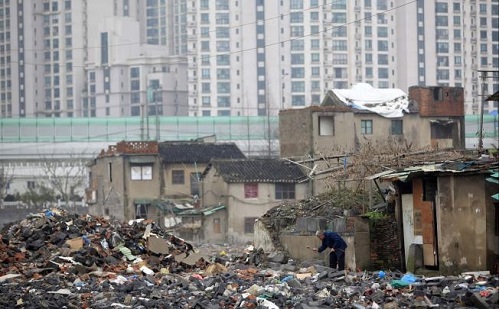
There really WAS a conspiracy. It was not "tinfoil hat fear-mongering."
The takedown of Vietnam happened slowly, but it unfolded systematically and the devastation was real. This is not science fiction: It happened over a century ago! If the "powers that be" (in that case, France. In our own case...who? We'll leave that an open question for now -- and one that may have multiple answers...) could use such sophisticated techniques as long ago as the 1800s, what are they capable of today?
In Vietnam, the takedown happened "in a faraway nation." Is it happening closer to home today?
I'll leave this an open question as well. But it is worth pondering whether the techniques used in Vietnam and other colonies are now being turned on the people of the developed world. The ceaseless cries for "austerity" in Europe, for example, or policies in the U.S. that seem to be creating ever more poverty...
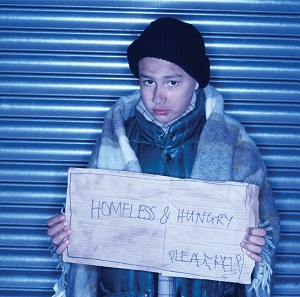
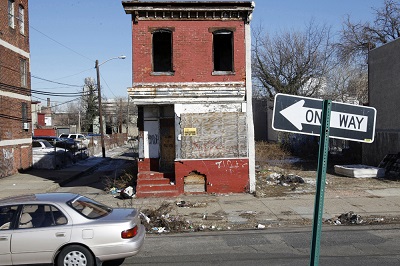
The takedown was anti-rural. People were disposessed of their farmland and herded into cities.
The creation of larger cities (including Saigon) and "trading towns" took place in Vietnam under France. Peasants lost their farms and were thus changed from landholders into easy-to-manipulate cheap labor that could be controlled in a single place. Many argue the same is going on today, with the Agenda 21 conspiracy theory largely positing the same sort of scenario. Even if you don't believe in Agenda 21 per se, there has been a huge increase of people all over the world moving from country to city in recent decades, with labor prices and autonomy plummeting accordingly.
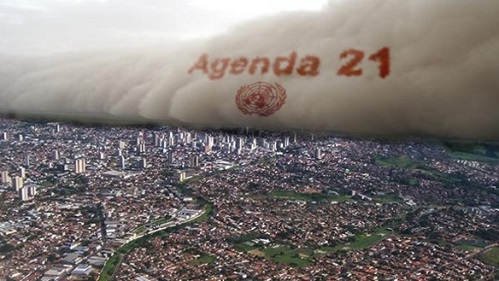
"Tradition" was the enemy in Vietnam. The same is true today.
To conquer Vietnam, the French had to subvert traditional ways of life. They had to break the backbone of the farming economy and turn it into a slave-mining-and-plantation economy. They had to turn the puppet government into a purveyor of empty rituals, stripping it of its real power. Above all, they had to subvert the idea of "nationalism," splitting Vietnam into three smaller countries. Ask yourself: Why do TPTB today focus so much on subverting tradition and patriotism? Why are traditional family structures relentlessly hammered on TV and the movies? Is this a more insidious version of the way the French broke down traditional power at the village level -- only now aiming even closer to the heart -- at the family!? Why is "patriotism" becoming a dirty word? Why the constant emphasis on erasing old boundaries and borders?
There is a lot to think about here. I hope this information serves to spark thought and debate. The stakes today are higher than they ever have been...and closer to home, too. Yesterday, Vietnam. Today, somewhere else. Tomorrow...your back yard?
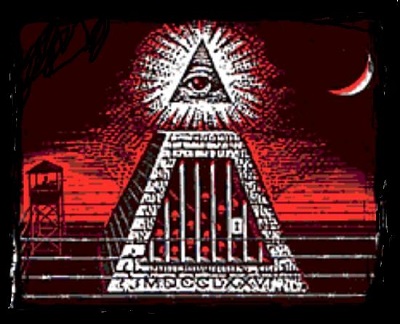


So, if you've read all the above, a few things might be apparent when you compare the sad story of Vietnam's takedown with the world of today. I will list the points I feel are relevant. Please feel free to brainstorm and add your own.
Subversion and takedown takes time.
It was a long process in Vietnam; it didn't happen overnight. Like the old metaphor of the frog slowly boiling in the pot of water, at any given point it might be argued that not much was changing. The old Vietnamese imperial government and its ritual symbols remained intact, although it came to have less and less influence. Change happens faster in today's world, but still slow enough that it can be denied at any given moment.
Domination takes place in the guise of "democracy" and "freedom."
The French used the rubric of "freedom" and "elections" to subvert the power of the old village councils and create local chaos, using divide-and-conquer strategies so they could consolidate power without opposition at the grassroots level. They also played on the greed of local elites to impoverish the peasants, all the while crowing about "progress." If you have been paying attention to the recent headlines, this might sound familiar...

"We are bringing progress to primitive, backwards people."
The French could point to gleaming new roads and canals, as well as modern buildings and other features, and claim that they were bringing new prosperity and development to Vietnam. Of course, these modern conveniences only benefitted a very few, and the French occupation made the vast majority of Vietnamese far poorer and more miserable than they had been before.

There really WAS a conspiracy. It was not "tinfoil hat fear-mongering."
The takedown of Vietnam happened slowly, but it unfolded systematically and the devastation was real. This is not science fiction: It happened over a century ago! If the "powers that be" (in that case, France. In our own case...who? We'll leave that an open question for now -- and one that may have multiple answers...) could use such sophisticated techniques as long ago as the 1800s, what are they capable of today?
In Vietnam, the takedown happened "in a faraway nation." Is it happening closer to home today?
I'll leave this an open question as well. But it is worth pondering whether the techniques used in Vietnam and other colonies are now being turned on the people of the developed world. The ceaseless cries for "austerity" in Europe, for example, or policies in the U.S. that seem to be creating ever more poverty...


The takedown was anti-rural. People were disposessed of their farmland and herded into cities.
The creation of larger cities (including Saigon) and "trading towns" took place in Vietnam under France. Peasants lost their farms and were thus changed from landholders into easy-to-manipulate cheap labor that could be controlled in a single place. Many argue the same is going on today, with the Agenda 21 conspiracy theory largely positing the same sort of scenario. Even if you don't believe in Agenda 21 per se, there has been a huge increase of people all over the world moving from country to city in recent decades, with labor prices and autonomy plummeting accordingly.

"Tradition" was the enemy in Vietnam. The same is true today.
To conquer Vietnam, the French had to subvert traditional ways of life. They had to break the backbone of the farming economy and turn it into a slave-mining-and-plantation economy. They had to turn the puppet government into a purveyor of empty rituals, stripping it of its real power. Above all, they had to subvert the idea of "nationalism," splitting Vietnam into three smaller countries. Ask yourself: Why do TPTB today focus so much on subverting tradition and patriotism? Why are traditional family structures relentlessly hammered on TV and the movies? Is this a more insidious version of the way the French broke down traditional power at the village level -- only now aiming even closer to the heart -- at the family!? Why is "patriotism" becoming a dirty word? Why the constant emphasis on erasing old boundaries and borders?
There is a lot to think about here. I hope this information serves to spark thought and debate. The stakes today are higher than they ever have been...and closer to home, too. Yesterday, Vietnam. Today, somewhere else. Tomorrow...your back yard?

edit on 9-3-2014 by Never Despise because: (no reason given)
Everything happens slowly if one lives long enough and can free up enough of one's time to watch and think about what one sees during one's free
time.
Or if one has a keen interest in history and can see the rhythm of it.
Or if one has a keen interest in history and can see the rhythm of it.
One of the best, if not the best thread, I've seen all day. Excellent!
edit on bSun, 09 Mar 2014 00:16:56
-0600am67America/Chicago3amSunday09America/Chicago by brazenalderpadrescorpio because: (no reason given)
Never Despise
...So, if you've read all the above, a few things might be apparent when you compare the sad story of Vietnam's takedown with the world of today. I will list the points I feel are relevant. Please feel free to brainstorm and add your own...
I think there is a lot that can be said and I will revisit this thread again and add some more comments.
One thing that struck me was the brutal mechanics of economic measures. Monopoly and taxes driving up prices, forcing people to "close out" and end up taking crap work that made them poorer than ever. This is going on EVERYWHERE. Example: A Wal-Mart (or other retail giant) moves in and all the mom-and-pop stores go under. Instead of being their own bosses, former owners are forced to become wage slaves at one of a few chains (Wal-Mart, McDonalds, Starbucks, etc.) which kill local culture and use their near-monopoly status and raw muscle to lay waste to anything in their path.
Inflation of basic goods is another good way to get people to go into indentured servatude, to ratchet down their status and make them easier to manipulate.
There's more I have to say, but that's all I have time for now.
Very informative post. Thank you.
Let me play devil's advocate on it. Could one not see the same influences, and therefore changes, occur in any nation?
If change is inevitable, especially with exposure to new/different cultures and concepts, then is it more realistic to look at the people and culture in how they accept or absorb or reject that change?
A culture whose people is alert, informed and thinks about these "changes" and their potential downsides are more likely to screen or filter those influences.
To over-simplify, these changes/subversions of a culture can only occur if the locals permit it. be it through ignorance, indifference or self-serving agenda.
Even simpler, an individual or a nation, for that matter, is responsible for it's own condition and more importantly, how it responds to those changes/influences.
Despite all the reasons, even if valid, assuming a victim's role-"done to me"-is the real culprit.
Even with the imperfections of western culture, the events of today would approach an impossibility of occurring even 20-30 years ago. The very same "influences" would have never even gotten traction.
That tells me it's not the external influences that subverts, it's the people themselves that allow it.
Let me play devil's advocate on it. Could one not see the same influences, and therefore changes, occur in any nation?
If change is inevitable, especially with exposure to new/different cultures and concepts, then is it more realistic to look at the people and culture in how they accept or absorb or reject that change?
A culture whose people is alert, informed and thinks about these "changes" and their potential downsides are more likely to screen or filter those influences.
To over-simplify, these changes/subversions of a culture can only occur if the locals permit it. be it through ignorance, indifference or self-serving agenda.
Even simpler, an individual or a nation, for that matter, is responsible for it's own condition and more importantly, how it responds to those changes/influences.
Despite all the reasons, even if valid, assuming a victim's role-"done to me"-is the real culprit.
Even with the imperfections of western culture, the events of today would approach an impossibility of occurring even 20-30 years ago. The very same "influences" would have never even gotten traction.
That tells me it's not the external influences that subverts, it's the people themselves that allow it.
brazenalderpadrescorpio
One of the best, if not the best thread, I've seen all day. Excellent!edit on bSun, 09 Mar 2014 00:16:56 -0600am67America/Chicago3amSunday09America/Chicago by brazenalderpadrescorpio because: (no reason given)
Totally agree with this comment and it's choice of words.
Star and Flag! Excellent without a doubt.
Thanks for the positive feedback, everyone.
I'll briefly address this point:
I think you are correct to a large degree. There were two other nations in the region that were subjected to similar pressures around the same time, but which avoided being colonialized: Japan and Thailand (then Siam). In Japan's case, a high degree of internal cohesion and the ability to quickly amd aggresivly adopt Westrrn technology saved them. In Thailand, skillful diplomatic playing of Britain and France off against each other allowed them to retain independence as a buffer state between the the two European powers. In both cases, awareness was key.
I would say awareness is not enough, however. You also need unity and the will/ability to act decisively. I'm sure an element of luck is important too.
When I look at history, personally, I never play the "blame game," which is for people with polemical agendas. I try to take a more impartial view. So in this light, causes are both external and internal. I also think with reference to our own time, the question of internal vs external is less important than ever, because I would argue that these tactics are now being employed globally to break down all tradtion, in developed and developing countries alike.
I'll briefly address this point:
nwtrucker
Very informative post. Thank you.
Let me play devil's advocate on it. Could one not see the same influences, and therefore changes, occur in any nation?
If change is inevitable, especially with exposure to new/different cultures and concepts, then is it more realistic to look at the people and culture in how they accept or absorb or reject that change?
A culture whose people is alert, informed and thinks about these "changes" and their potential downsides are more likely to screen or filter those influences.
I think you are correct to a large degree. There were two other nations in the region that were subjected to similar pressures around the same time, but which avoided being colonialized: Japan and Thailand (then Siam). In Japan's case, a high degree of internal cohesion and the ability to quickly amd aggresivly adopt Westrrn technology saved them. In Thailand, skillful diplomatic playing of Britain and France off against each other allowed them to retain independence as a buffer state between the the two European powers. In both cases, awareness was key.
I would say awareness is not enough, however. You also need unity and the will/ability to act decisively. I'm sure an element of luck is important too.
When I look at history, personally, I never play the "blame game," which is for people with polemical agendas. I try to take a more impartial view. So in this light, causes are both external and internal. I also think with reference to our own time, the question of internal vs external is less important than ever, because I would argue that these tactics are now being employed globally to break down all tradtion, in developed and developing countries alike.
Never Despise
..."We are bringing progress to primitive, backwards people."
The French could point to gleaming new roads and canals, as well as modern buildings and other features, and claim that they were bringing new prosperity and development to Vietnam. Of course, these modern conveniences only benefitted a very few, and the French occupation made the vast majority of Vietnamese far poorer and more miserable than they had been before...
Thought of this when I saw the following today. Ye olde "modernization" trump card:
"...A project to modernise Ukraine’s gas transmission infrastructure forms part of the EU’s $15 billion promised aid package to Kiev, with an initial loan possible in the near future..."
...There’s also a lot more to that than either Ukraine or EU are saying, and that makes me suspicious. As does the line about “part” of the promised aid being set aside for “modernizing” Ukraine’s gas transmission infrastructure. What does that mean? That Shell and BP are going to come in to make sure that get control, and push aside Gazprom? What else could it be?...
Source:
www.theautomaticearth.com...
edit on 3/9/2014 by FailedProphet because: (no reason given)
Great presentation thread.
Is it alright if I add some to it in relation?
Holodomor
The Irish Potato Famine
Is it alright if I add some to it in relation?
Holodomor
The term Holodomor refers specifically to the brutal artificial famine imposed by Stalin's regime on Soviet Ukraine and primarily ethnically Ukrainian areas in the Northern Caucasus in 1932-33.
Continued...
Timeline:
1930
1.5 million Ukrainians fall victim to Stalin's "dekulakization" policies, Over the extended period of collectivization, armed dekulakization brigades forcibly confiscate land, livestock and other property, and evict entire families. Close to half a million individuals in Ukraine are dragged from their homes, packed into freight trains, and shipped to remote, uninhabited areas such as Siberia where they are left, often without food or shelter. A great many, especially children, die in transit or soon thereafter.
Source
The Irish Potato Famine
The Irish potato famine was not simply a natural disaster. It was a product of social causes. Under British rule, Irish Catholics were prohibited from entering the professions or even purchasing land. Instead, many rented small plots of land from absentee British Protestant landlords. Half of all landholdings were less than 5 acres in 1845.
Source
edit on 9-3-2014 by dreamingawake because: (no reason given)
Never Despise
....First, the French (acting through the puppet-run imperial Court, now a shadow of its former glory) jacked up taxes on the Vietnamese peasantry. They also had the central government establish a monopoly on salt, alcohol, and opium. With the taxes and monopoly, prices for necessities soared as much as 600%, forcing huge numbers of peasants into bankruptcy and ruin....
And the hits just keep on coming:
"...It will be shocking for the average American… if the petro dollar dies and the U.S. loses its reserve currency status in the world there will be no middle class.
The middle class and the low class… wow… what a game changer. Your cost of living will quadruple..."
Source:
edit on 3/9/2014 by FailedProphet because: (no reason given)
reply to post by Never Despise
Great work! Great read! The premise is spelled out in the movie Grinding America Down. No doubt this is what's happening and as you allude to, not only here in the US, but everywhere.
Great work! Great read! The premise is spelled out in the movie Grinding America Down. No doubt this is what's happening and as you allude to, not only here in the US, but everywhere.
I think you are spot on. The correlations with how lybia, Iraq, Syria ect and now Ukraine have been handled are very similar. Covertly causing discord
amongst the people and the installation of puppet governments is how the West molds policies to suit their interests. Another good point is how we are
subjected to the same tactics, afterall the people closest to home need to remain conquered aswell and if the ultimate goal is a one world government
then it's high time to start taking the freedom out of free societies.
edit on 10-3-2014 by JewelOfDenial because: (no reason given)
new topics
-
President BIDEN Vows to Make Americans Pay More Federal Taxes in 2025 - Political Suicide.
2024 Elections: 1 hours ago -
Ode to Artemis
General Chit Chat: 2 hours ago -
Ditching physical money
History: 5 hours ago -
One Flame Throwing Robot Dog for Christmas Please!
Weaponry: 5 hours ago -
Don't take advantage of people just because it seems easy it will backfire
Rant: 6 hours ago -
VirginOfGrand says hello
Introductions: 6 hours ago -
Should Biden Replace Harris With AOC On the 2024 Democrat Ticket?
2024 Elections: 7 hours ago -
University student disciplined after saying veganism is wrong and gender fluidity is stupid
Education and Media: 9 hours ago -
Geddy Lee in Conversation with Alex Lifeson - My Effin’ Life
People: 11 hours ago -
God lived as a Devil Dog.
Short Stories: 11 hours ago
top topics
-
Hate makes for strange bedfellows
US Political Madness: 15 hours ago, 20 flags -
University student disciplined after saying veganism is wrong and gender fluidity is stupid
Education and Media: 9 hours ago, 12 flags -
Police clash with St George’s Day protesters at central London rally
Social Issues and Civil Unrest: 12 hours ago, 9 flags -
President BIDEN Vows to Make Americans Pay More Federal Taxes in 2025 - Political Suicide.
2024 Elections: 1 hours ago, 7 flags -
TLDR post about ATS and why I love it and hope we all stay together somewhere
General Chit Chat: 13 hours ago, 7 flags -
Should Biden Replace Harris With AOC On the 2024 Democrat Ticket?
2024 Elections: 7 hours ago, 6 flags -
Don't take advantage of people just because it seems easy it will backfire
Rant: 6 hours ago, 4 flags -
One Flame Throwing Robot Dog for Christmas Please!
Weaponry: 5 hours ago, 4 flags -
God lived as a Devil Dog.
Short Stories: 11 hours ago, 3 flags -
Ditching physical money
History: 5 hours ago, 3 flags
active topics
-
University student disciplined after saying veganism is wrong and gender fluidity is stupid
Education and Media • 23 • : BigDuckEnergy -
President BIDEN Vows to Make Americans Pay More Federal Taxes in 2025 - Political Suicide.
2024 Elections • 3 • : BingoMcGoof -
Russia Ukraine Update Thread - part 3
World War Three • 5717 • : Arbitrageur -
Should Biden Replace Harris With AOC On the 2024 Democrat Ticket?
2024 Elections • 44 • : budzprime69 -
Hundreds of teenagers flood into downtown Chicago, smashing car windows
Other Current Events • 111 • : 777Vader -
British TV Presenter Refuses To Use Guest's Preferred Pronouns
Education and Media • 125 • : Annee -
Who guards the guards
US Political Madness • 4 • : kwaka -
New whistleblower Jason Sands speaks on Twitter Spaces last night.
Aliens and UFOs • 44 • : pianopraze -
"We're All Hamas" Heard at Columbia University Protests
Social Issues and Civil Unrest • 263 • : YourFaceAgain -
Remember These Attacks When President Trump 2.0 Retribution-Justice Commences.
2024 Elections • 50 • : Asher47
28
